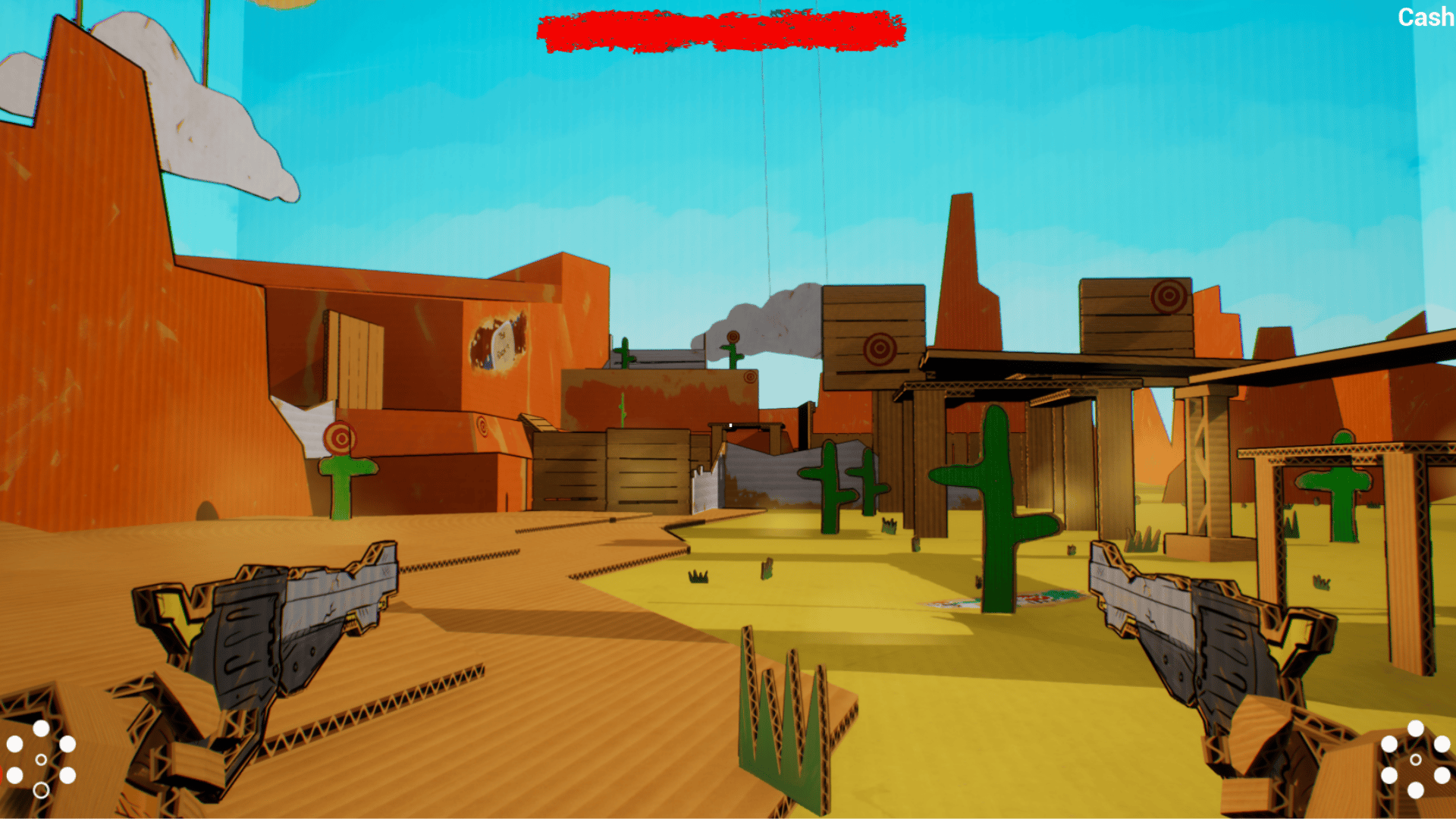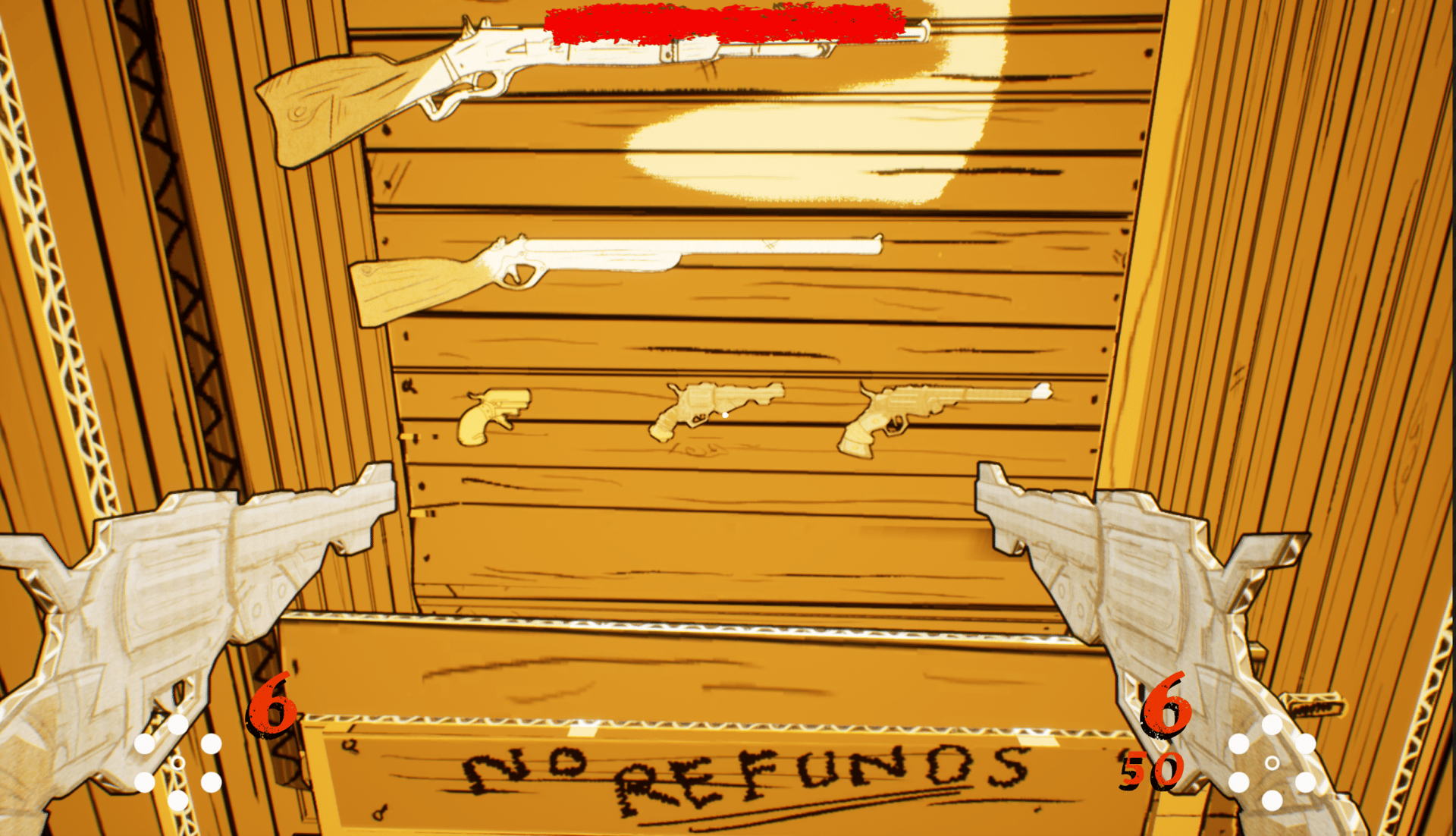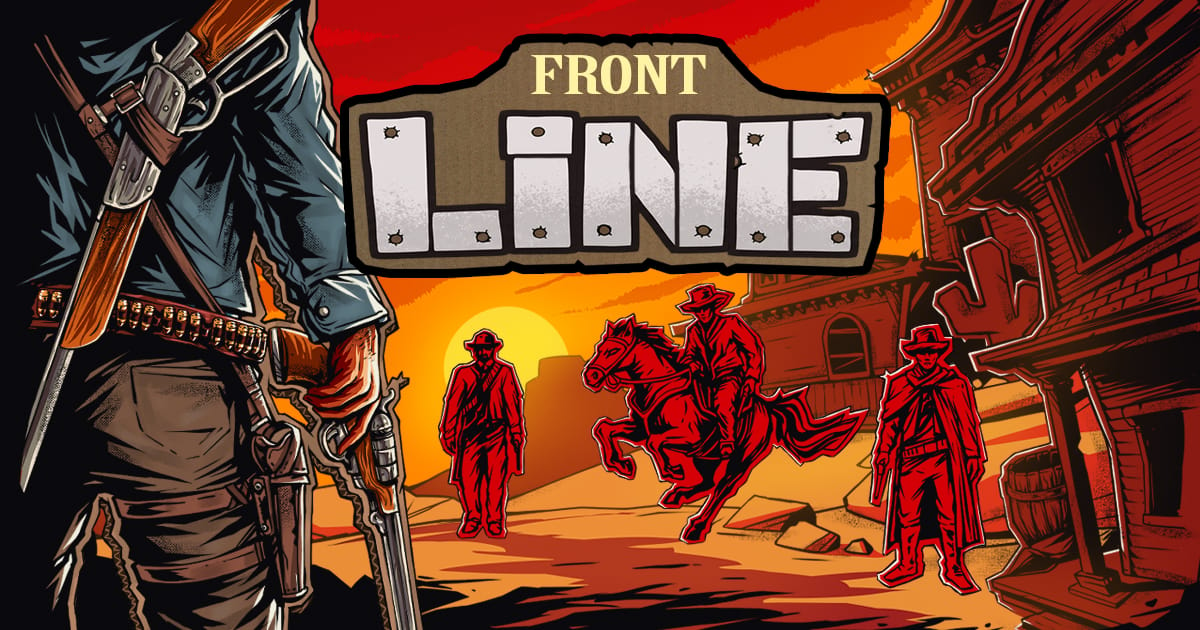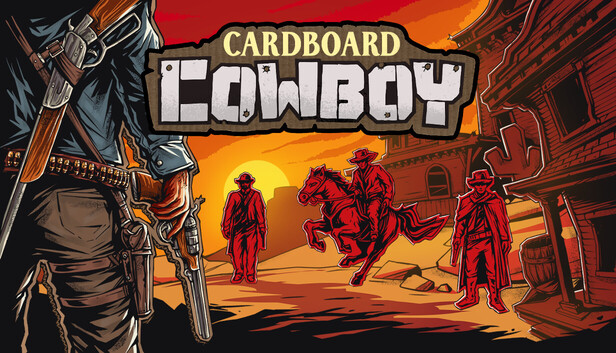FRONTLINE
Cardboard guns. Real stakes.

The first thing Jorge Soto tells me isn’t about the guns or the gallery or the Western swagger. It’s this: “Everybody said the cardboard’s cool—but they also asked why I picked cardboard.”
Because he couldn’t model. Not yet. “It started as an inability to create anything complex in 3D,” he says. So he cut around the wall. If everything’s a flat cut-out—a sheriff, a six-shooter, a saloon door—then he can draw a hundred of them and pour his time into the two obsessions he did have: sound and feel. Cardboard wasn’t a joke; it was permission. And Cardboard Cowboy started to sound and move like a game you can’t help but chase.
He wanted a running shooting gallery—the fairground kind that clacks and clatters when you hit a plate. “You shoot a target and something happens,” he grins. Animations kick. Goofy characters pop to life. A door slides open if you earn it. Completionists and speedrunners can smell that design from across the midway. Rooms on a timer. Chains to keep. Chunks of time to shave. Throw the gun, bounce it off a wall, scoop it mid-stride, keep the combo alive. “Keith messaged me week one like, ‘By the way, guns can be thrown now,’” Jorge laughs. “We’re already over-scoping—which is great. Just kidding.” (He’s not really kidding.)
And then there’s the money.
Rising Tides to Rising Stakes

With our mates at Blue Ocean Games, we were given a closer look at what a real cheque does to a small game. Jorge didn’t pitch as a seasoned studio. He pitched as a solo dev with a cardboard western and a trailer that placed 24th in a field of over a thousand. “I entered to validate the idea,” he says. “If nobody cared, I was ready to move on.” But people did care. And Blue Ocean said yes—to the tune of $100,000 USD.
That’s not a grant. It’s investment. It changes your posture.
“I’m forming a corporation,” Jorge says, the words landing with equal parts pride and gulp. “I’m fairly young and inexperienced in business… to tell myself I’m now forming this corporation is a scary jump off.” The deal is grown-up: a revenue share that only kicks in after the first $100k in revenue, then runs for two years, plus 20% equity in the studio. Early winners pushed hard on terms, Blue Ocean listened, and Jorge benefits from a cleaner contract. He’s honest about the trade-offs. “If you’ve got overhead and a big team already, it might not fit,” he says. “But as a solo developer… this was the on-ramp we wouldn’t otherwise have.”
What does a cheque feel like from the chair he sits in? Focus—and pressure. “I’ve levelled up the stress in my life—which is pretty great,” he says, deadpan, then laughs. “I don’t think I’d want any other challenge.” The money buys time, and a team: a programmer (Keith) and a guitarist-leaning sound designer (Peter) who can bend the western twang into something that crackles. It buys process—frequent playtesting—so fun is proven in the wild, not just believed in the mirror. And it buys back-of-house sanity: incorporation, payroll, a Kickstarter milestone with specialist support so development doesn’t flatline while you’re writing copy and cutting trailers.
That last one matters. “I heard from a studio that during their Kickstarter, all development ceased,” Jorge says. “If we get support for that while still building, that’s huge.”
There are many roads to a game: national grants that pay for a track or two, publishers who want proof and polish, Kickstarter that turns a community into a cashflow, private investment that asks for skin in the outcome. Jorge’s path is the last one—nudged into motion by a trailer competition called Rising Tides. “Best case is something you didn’t plan happens,” he says. “Worst case is nobody notices.” He’d prepared himself to quit. He left with a company.
What I like most is how stubbornly the cardboard stayed. Funding didn’t sand off the idea’s edge; it sharpened the execution—the cadence, the sprint rhythm, the insistence on feedback. The toy-box aesthetic still lets them author a silly amount of targets, props, and guns quickly, so the craft can live where it counts: timing windows, throw-and-recover loops, those tiny haptics your eyes can hear.
This is where you can read the industry between the lines. “It’s investment, not a grant,” he says again, careful to draw the distinction. It comes with numbers and nerves—but also with people. “I’ve got teammates now,” Jorge says, and there’s relief in it. “Other people depending on this for their portfolio… it helps me push forward.” And Blue Ocean aren’t just writing cheques and vanishing; they’re building portfolio muscle: pooled marketing, warm intros, pressure where it’s productive. The goal isn’t to squeeze; it’s to compound—to help a studio stand, then ship the next thing faster.
From One to Another

If you’re a developer reading this, Jorge’s advice is painfully practical: ship a trailer. “If there’s a competition and you’re not sure—enter,” he says. “If nobody notices, fine. If they do, you’re suddenly having a different conversation.” It doesn’t have to be the magnum opus under your pillow. It can be the one that’s “not ready,” knocked into shape over a few late nights, because ready is a horizon that moves when you walk.
And if you’re curious what all this buys the player? A speedrunner’s fairground with a dusty grin. Timed rooms you learn like riffs. Plates that clack just right. A thrown gun you catch on the half-beat because you’ve practised it a hundred times. A western that knows it’s made of cardboard, and delights in how alive that can feel.
“Five months ago I was going to school for business administration,” Jorge says near the end. “Now I’m putting it into practice faster than I thought.” He pauses. “I needed something to focus on.”
A $100k cheque won’t make a unicorn. It doesn’t need to. It makes time, teammates, and tests—enough to turn a scrappy cardboard prototype into a studio’s first real swing. From where we’re standing, that’s plenty epic.
Playtest: Come Break Their Game
🕛 Starts: December 4th, 12PM PST
🌙 Ends: Indefinitely!
🎯 Join their Discord to jump in and help them stress-test Cardboard Cowboy.
FOLLOW DEAD DEV GAMES AND WHAT THEY’RE CREATING:
The Indieformer Team
Thanks for reading — and if you ever want to chat games, marketing, or the weirdness of the indie grind, we’re always lurking on Threads, BlueSky and X. Come say hi.
We’ve also put together a few free guides to help indie devs get their projects in front of the right people. You can view them anytime: Steam Marketing Guide, Press Kit Guide.


